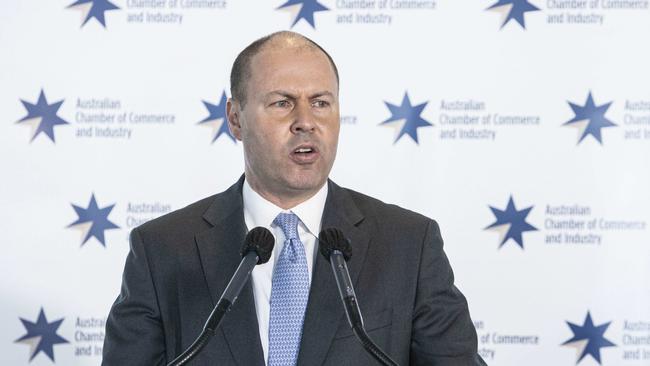Biggest changes to bankruptcy laws in 30 years, says Treasurer Josh Frydenberg
Proposed changes should not be used ‘to protect dodgy companies’ or allow small businesses to ‘rack up unsustainable debt’.

Insolvency practitioners have warned that proposed changes to insolvency laws should not be used to protect dodgy companies or allow small businesses to rack up unsustainable debt levels.
Treasurer Josh Frydenberg on Thursday outlined plans for a major restructuring of insolvency laws for businesses with debts of less than $1m.
Under the proposals, which Mr Frydenberg called the biggest changes to bankruptcy laws in 30 years, small business owners facing financial difficulty will be allowed to remain in control of their businesses while they try to restructure their debt.
The proposals would allow companies in financial trouble to turn to restructuring practitioners who have a 35 day window to work with the company and its creditors to agree on a restructuring plan.
This differs from existing laws on administration which see the board step aside during the restructuring process while the administrator oversees the company and negotiates with creditors.
While industry practitioners welcome the proposals, they are concerned that the more flexible insolvency regime could allow disreputable operators to continue to trade and lenders to advance funds to companies which have no chance of paying them back.
Deloitte’s head of restructuring services Sal Algeri said he welcomed any change that would help save businesses.
“We see this as a positive step,” he said. “It is a concept which makes a lot of sense.
“It provides a good opportunity to allow people to continue with their businesses and provide them with some breathing space to get them through COVID-19 without the stigma of having to go into administration and to trade out of their situation.”
But he was concerned that it should not be seen by some directors “as an opportunity to keep a bad business going”.
“We need to make sure that the right companies can access this assistance and there are no loopholes to allow companies that shouldn’t qualify to continue to trade,” he said. “Companies that are dead men walking shouldn’t qualify.”
Mr Algeri said the industry would be working with government on the proposals. The Australian Restructuring, Insolvency and Turnaround Association (ARITA) said it “largely welcomed” the proposed reforms.
“Policies to allow restructuring of small business and the streamlining of unnecessary processes in small company liquidations are definitely overdue,” ARITA chief executive John Winter said.
“Since the beginning of the COVID crisis we have been constantly advocating adoption of these changes to Treasury.
“But this is a very complex change and there are significant issues in the detail.
“The biggest issue is going to be the expectation that creditors — from banks to suppliers, employees, subcontractors and the like — are going to keep allowing businesses to rack up more debt while this restructuring occurs, knowing that they may end up being owed more and getting nothing.”
Mr Winter called on the government to regulate the provision of insolvency and restructuring advice to “shut down the exploding level of dodgy, unqualified advisers who facilitate phoenixing and asset stripping”.
The short time line to have the proposals operate from January 1 as well as pressures on the restructuring profession trying to operate during COVID could make “implementing these changes incredibly difficult”.
Mr Winter said he had first proposed the changes to the Treasurer in 2014.
He criticised Mr Frydenberg for comparing the reforms to the US Chapter 11 bankruptcy process.
“That’s just the Treasurer showing he doesn’t know what he’s talking about,” Mr Winter wrote on LinkedIn.
“There’s nothing fast, simple or cheap about Chapter 11. Chapter 9 is for that.”
Mr Frydenberg said the government estimated that the reforms would cover around 76 per cent of businesses subject to insolvencies today, 98 per cent of which had less than 20 employees.
He said the measures would “reduce costs for small businesses, reduce the time they spend in the insolvency process, ensure greater economic dynamism, and ultimately help more small businesses get to the other side of the crisis.”
BCA CEO Jennifer Westacott, said the proposed changes would provide a “lifeline”.


